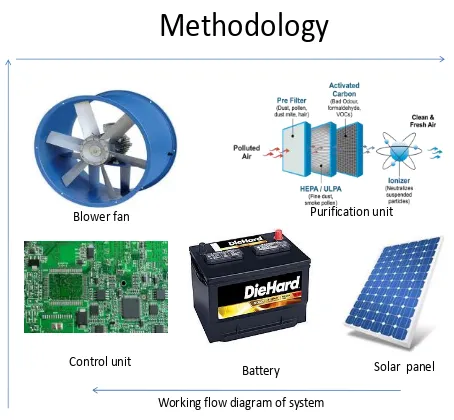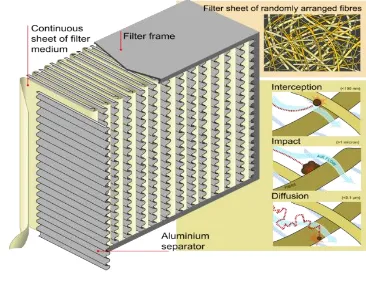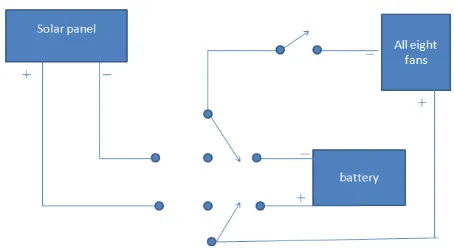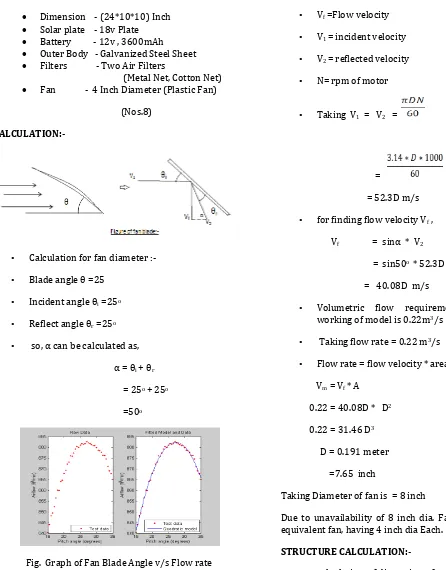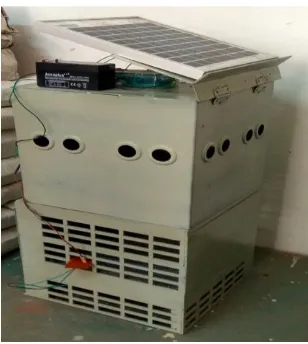© 2019, IRJET | Impact Factor value: 7.211 | ISO 9001:2008 Certified Journal
| Page 2509
Design & Fabrication of Solar Powered Air Filtration and
Ventilation System
Deep Vanpariya
1, Vyom Vyas
2, Sujal Rana
3, Harshit Shah
41,2,3,4
Students of Bachelor of Technology, Department of Mechanical Engineering, Babaria Institute of Technology,
Gujarat, India, Approved by AICTE, Affiliated to Gujarat Technoloical University, Gujarat.
---***---
ABSTACT: In some application areas like machineworkshops, cement industrial area, food processing plant chemical plant etc. It requires air cleaning for comfort of workers.To do so, we are designing the air filtration unit which keeps inside air clean and comfortable for people working there .Our system has multiple stages which simultaneously throws inside air out and inside air in after filtering it. Air flowing inside is filtered with help of different filter layers.With the help of calculations & experiments we have finalized data required to fabricate this unit.
Key Words: Solar Power, Air Filtration, Air Ventilation, PM2.5&PM10
LITRATURE REVIEW:-
(1) A Review of Air Filtration Technologies for Sustainable and Healthy Building Ventilation.
Authors:- Xingxing Zhang, Llewellyn Tang(2017)
Methodology:- Theoritical calculation
Reviwe:- This paper presents a comprehensive review on the synergistic effect of different air purification technologies, air filtration theory, materials and standards.
It evaluated different air filtration technologies by considering factors such as air quality improvement, filtering performance, energy and economic behaviour, thermal comfort and acoustic impact. Current research development of air filtration technologies along with their advantages, limitations and challenges are discussed. This paper aims to drive the future of air filtration technology research and development in achieving sustainable and healthy building ventilation.
(2) Design and Fabrication of Solar Powered Roof Ventilators.
Authors:- Ti Wai Chan , Umar Nirmal (2015)
Methodology:- Scale model experiment
Reviwe:- This research intends to design a solar powered roof exhaust fan with a simple installation design.
-The design has a structure such that parts are oriented around the axis of the fan. Two types of fans were tested: a centrifugal fan and an axial fan. In these experiments, parameters such as ambient, room and attic temperature were measured. The results showed that the axial fan is more effective.
(3) Design and Fabrication of Solar Powered Air Purifier.
Authors:- Manjeet Kumar, Satinder Jeet Singh, Prabhat Kumar Shukla, Raj Varun Singha Manash Dey, Ashutosh Singh
Methodology:-scale model experiment
Reviwe:- This research paper is about designing and fabricating an air purifier system which is powered by solar energy and testing the effectiveness of the system to curb the air pollution. The focus is on extracting the suspended particulate matter from the air which are the major contributors in the pollution of air in many urban cities. It works on a non-conventional method and intents to achieve best possible air purification results using eco-friendly and economical method. It works on the basic principle of adhesion of the suspended particles in the air with the liquid and settles down due to being heavier than air and gets separated from the air helping us to achieve better air quality index. The fans and the pump in system are operated with the help of solar energy, produced by solar panels, which converts the solar radiations into electricity
(4)A Review on Solar Powered Air Conditioning System
Authors:- Mr. Amitkumar Gupta , Mr. Shubham Choudhary ,Mr. Abhinish Thakur, Mr. Kaushik Roy
© 2019, IRJET | Impact Factor value: 7.211 | ISO 9001:2008 Certified Journal
| Page 2510
Reviwe:-An air conditioning system utilizing solar energy would generally be more efficient cost wise, if it was used to provide cooling requirement in the commercial and domestic as well as industrial buildings. And in twenty first century is rapidly becoming the perfect energy storm and the greatest challenge facing mankind is energy. The demand for energy could double or triple as global population grows and developing countries expand their economies. And so the most abundant energy resource available to human society is solar energy. Among the various renewable energy resources, the least utilized energy is solar energy.
(5) Design and Analysis of An Axial Fan Used in
Ventilation system
Authors:- Parasaram Sarath Chandra Dr. K. Sivaji Babu (2016)
Methodology:- MATlab simulation,ANSYS software simulation
Reviwe:- The effectiveness of the design procedure is verified with CFD simulation.
The target of improved static efficiency (higher than 67%) has been achieved and it’s been calculated as 71%. Performance of the design fan has been investigated by means of ANSYS CFX, a commercial CFD software. In this paper, theoretical results obtained are compared by performance .
OBJECTIVES:- [1]The main objective of our system is to
purify & clean the air for human comfort.
[2]In some application areas like machine workshops,
cement industrial area, food processing plant, chemical plant, automobile garage etc., air cleaning is required for comfort of workers. Our system filters unwanted particles like dust, debris, pollens and it also removes fumes, moisture, heat produced inside by ventilating it.
INTRODUCTION:-
As ever noticed by one there are many indoor place where air quality management is required like auto garages,machine workshop, cement industrial area etc.., At these places perticulate matter is very high in Amount thus it makes unhealthy environment for workers & can cause the breathing & lungs problem to them.
In conventional system there is only ventilation is done via pressure difference between outside and inside space. Since this is natural phenomena , it is uncertain in nature hence can have variable ventilation rate throught the day. These all problems are overcome by using drought fans &
solar powered PV panels in our system. despite of conventional ventilation system our system has multipurpose solar powered system, which can run throught the day on solar power and even in night with stored battery backup power .it has two system called as ventilation unit & filtration unit
In our system different type of methodology is used for ventilation & filtration purpose. In normal system only one way filtration is done by simply taking air from contaminated space and after filtering again throwing back to the same place. While in our system two way path is introduced for faster and easy removal of unwanted particles.
Although there are many systems are available in market but our system in cost effective & it is the only one of its all kind of system available in market.
WORKING COCEPT:-
• In our system different type of methodology is used for ventilation & filtration purpose.
• In normal system only one way filtration is done by simply taking air from contaminated space and after filtering again throwing back to the same place.
• While in our system two way path is introduced for faster and easy removal of unwanted particles. Electric power is developed in solar plate, and then stored in battery. This power is used then to run the electric fans of filter unit.
• The different filters are used in unit to clean the air coming inside space.
© 2019, IRJET | Impact Factor value: 7.211 | ISO 9001:2008 Certified Journal
| Page 2511
Ventilation system:- Ventilation system is used for theremoval of the heat, suffocation(CO2), moisture, Odours,
Fumes(gases) etc.. suspended inside space by ventilating it to the outside space, with help of blowing fans.
Filtration system:- Filteration system is used for the filteration of the dust, micro particles, contamination, pollens etc..with the help of filterers & blowing fan.
SYSTEM DESCRIPTION:-
Control unit
Battery Solar panel Blower fan Purification unit
Working flow diagram of system
Methodology
fig 2 .Flow Diagram With Components
[image:3.612.44.271.229.439.2]Fig 3 .Block Diagram Representing the Flow of System Above diagram represents the flow of system with the help of blocks indicating element stage through the system.
INDIVIDUAL COMPONENT DETAIL:-
Components used in our system is listed below:-
• Fans
• Motors
• Battery & Wiring
• Solar Plate
• Outer Body Structure Material
• Filters
(1) Axial fan
Mechanically, a fan can be any revolving vane or vanes used for producing currents of air. Fans produce air flows with high volume and low pressure. Axial fans are used for creating flow parallel to its center axis so it is called as axial fan. We are using this type of fan in our system for generating air flow through filters for filtration process.
Fig 4. Axial Fan
(2) Motors
An electric motor is an electrical machine that converts electrical energy into mechanical energy. Most electric motors operate through the interaction between the motor's magnetic field and winding currents to generate force in the form of rotation. Electric motors can be powered by direct current (DC) source
[image:3.612.374.523.380.549.2]© 2019, IRJET | Impact Factor value: 7.211 | ISO 9001:2008 Certified Journal
| Page 2512
Fig 5. D.C Motors
Motors are required to run the fans used in system. we are using 8v motors in our system.
Motor runs at 1000rpm which is required for proper volume flow rate through the system according to calculation.
(3) Filters
Type of Filters Listed Below:-
- Mechanical Filters
- Electrostatic (ionizing) Filters
- Coal (adsorption) Filters
-HEPAFilters (filters for better mechanical cleaning)
- Photocatalytic Filters
*Mechanical Filters
This type of filters is the most common used in air cleaners. Mechanical filters arrest large particles of dust, fabric fibers and animal dander.
They consist of the usual fine grid used as a pre-filter. Such filters are installed in almost all equipment and protect from dust, not only people but also the inside of equipment.
Particles go through this grid and settle on it. That is why filters should be cleaned in time. This process needed removing dust or washing.
We are also using this type of filters for our system.
-Description:-
We are using two type of filter for our project
1. Metal net filter
2. Cotton cloth filter
Both having different filtration capacity according to their mesh size.
First filter is for filtering large size particles, where another is for small particles.
[1] Metal Net Filter
Fig 6. Metal Net Filter
• Specification:-
• Particulate Size:-PM20*(20 micron)
• Thickness:-3mm
• Filter Efficiency:-65%
• Material:-(stainless sleel)
• Dimension:-(10*10)inch
[image:4.612.355.538.508.652.2][2] Corrugated Cotton Filter
Fig 7 . Corrugated Cotton Cloth Filter
• Specification:-
© 2019, IRJET | Impact Factor value: 7.211 | ISO 9001:2008 Certified Journal
| Page 2513
• Thickness:-5mm
• Filtration Efficiency-70%
• Material :- cotton
• Dimension:-(10*10)inch
(4) solar & Electrical System :-
[1]Solar Plate
Photovoltaic solar panels absorb sunlight as a source of energy to generate electricity. A photovoltaic (PV) module is a packaged, connected assembly of typically 6x10 photovoltaic solar cells. Photovoltaic modules constitute the photovoltaic array of a photovoltaic system that generates and supplies solar electricity in commercial and residential applications
[image:5.612.368.535.305.442.2]A single solar module can produce only a limited amount of power; most installations contain multiple modules. A photovoltaic system typically includes an array of photovoltaic modules, an inverter, a battery pack for storage, interconnection wiring, and optionally a solar tracking mechanism.
Fig 8 . Solar PV Panel
Fig 9 . Solar Circuit Diagram
[2] Battery and Wiring
Fig . Battery
Battery is used for storing power developed by solar plate. It stores power and than that power is utilized for running system.
12volt Battery has 3600mAh storing capacity of power which can be utilized for one day.
[3]Electrical Circuit Diagram:-
[image:5.612.342.569.561.685.2]© 2019, IRJET | Impact Factor value: 7.211 | ISO 9001:2008 Certified Journal
| Page 2514
TECHNICAL SPECIFICATION:- Dimension - (24*10*10) Inch
Solar plate - 18v Plate
Battery - 12v , 3600mAh
Outer Body - Galvanized Steel Sheet
Filters - Two Air Filters
(Metal Net, Cotton Net)
Fan - 4 Inch Diameter (Plastic Fan) (Nos.8)
CALCULATION:-
• Calculation for fan diameter :-
• Blade angle θ =25
• Incident angle θi =25o
• Reflect angle θr =25o
• so, α can be calculated as,
α = θi + θr
= 25o + 25o
[image:6.612.43.489.106.676.2]=50o
Fig. Graph of Fan Blade Angle v/s Flow rate
Reference: An optimal design for axial-flow fan blade: theoretical and
experimental studies
• Vf =Flow velocity
• V1 = incident velocity
• V2 = reflected velocity • N= rpm of motor
• Taking V1 = V2 =
=
= 52.3D m/s
• for finding flow velocity Vf ,
Vf = sinα * V2
= sin50o * 52.3D
= 40.08D m/s
• Volumetric flow requirement for optimum working of model is 0.22m3/s
• Taking flow rate = 0.22 m3/s
• Flow rate = flow velocity * area Vm = Vf * A
0.22 = 40.08D * D2
0.22 = 31.46 D3
D = 0.191 meter
=7.65 inch
Taking Diameter of fan is = 8 inch
Due to unavailability of 8 inch dia. Fan we can take four equivalent fan, having 4 inch dia Each.
STRUCTURE CALCULATION:-
• calculation of dimension of structure:-
© 2019, IRJET | Impact Factor value: 7.211 | ISO 9001:2008 Certified Journal
| Page 2515
• =8 + 2(1)
• l = 10 inch
• L = 2(l) =2(10) =20 inch
• B = l = 10 inch
• H = 2.4(l) =24 inch =2 feet
FILTER CALCULATION:-
• filter calculation :-
• Filter specification:-
• Filter size= 5μm
• Filter efficiency = 70%
• actual filtration rate
= 0.7*volume flow rate
= 0.7* 0.22
• Filtration rate= 0.16 m3/s
• Estimation of Filtration time :-
• Taking standard room size
= (4.5*4.9*3.0) m3
=66.15 m3
Calculated time for filtration process is,
Time =
=
=413.4 second =6.89 minute
• Taking time = 7 minute + 3 minute of allowance
= 10 minute
EXPERIMENTAL DATA:-
Considering the points:-
The experiment has done in close system.
Air quality index is taken as PM2.5 & PM10
CONDITION PM2.5(μg/m3) PM10(μg/m3)
Before
Experiment 121.5 205
[image:7.612.84.566.77.739.2]After Experiment 42.6 66.5
Table . Experimental Results
Fig 11. Actual Prototype
According to data, calculating the final efficiency of system :-
Efficiency by PM2.5= (valueof before – value of after)/(value of before)
=(121.5-42.6)/(121.5) =0.6493*100
= 64.93%
Efficiency by PM10= (205-66.5)/(205) = 0.6756*100 = 67.56%
- Thus overall efficiency is the average of both PM2.5 & PM10 ,that is 66.23% according to experinmental analysys. since calculated efficiency was 70%.
[image:7.612.373.527.280.452.2]© 2019, IRJET | Impact Factor value: 7.211 | ISO 9001:2008 Certified Journal
| Page 2516
CONCLUSIONS:-Our system is very simple & easy to install at any required industry and can be installed on roof at any workshop. System is embedded with solar power. Hence, no external power source required. Even no requirement of pressure difference due to provision of solar powered fans which runs continuously.
We have designed this system for air purification & ventilation purpose with low cost and higher flow rate. Thus this is the efficient product for the future. Also in future, modifications can be made to improve working efficiency without effecting setup.
REFERENCES:-
Design & Fabrication of Solar Powered Roof Exhaust Fan , (Article in International Journal of Advanced Manufacturing Technology · December 2015)
An Optimal Design for Axial-Flow Fan Blade: Theoretical and Experimental Studies ,(Cheng-Hung Huang* and Chung-Wei Gau (Department of Systems and Naval Mechantronic Engineering, National Cheng Kung University, Tainan, Taiwan,
R.O.c(Manuscript Received December 8, 2010;
Revised September 11, 2011; Accepted September 27, 2011)
Optimisation of Fan Blade Angle(Swaroop M P*,
Paul Raphy T*, Varun Menon*, Vivek
Balachandran*, Arjun M*, Melvin Raj C R**) ISSN : 2248-9622, Vol. 7, Issue 1, ( Part -2) January
2017, pp.69-71
Design and Analysis of An Axial Fan used in Kiln Shell Cooling(Parasaram Sarath Chandra1, Dr. K. Sivaji Babu2 and U. Koteswara Rao3, ISSN 0973-1784 Volume 12, Number 1 (2016), pp. 37-56)
Fabrication of Automatic Air Filter Cleaning System by (Gaurav Balpande1, Mayur Chaudhari2, Prerit R. Lambhate3, Ashish Lengure4, Nalini Turare5, Professor A.N. Lade6, Volume: 04 Issue: 03 | Mar -2017)
Extracting the Maximum Energy from Solar Panel ,(Mohamed Nfaoui *, Khalil
El-Hami,published in year 2018)
J. Gao, P. Wargocki and Y. Wang, “Ventilation System Type, Classroom Environmental Quality and Pupils' Perceptions and Symptoms”. Building and Environment, Vol.75,
pp.46-57, 2014
